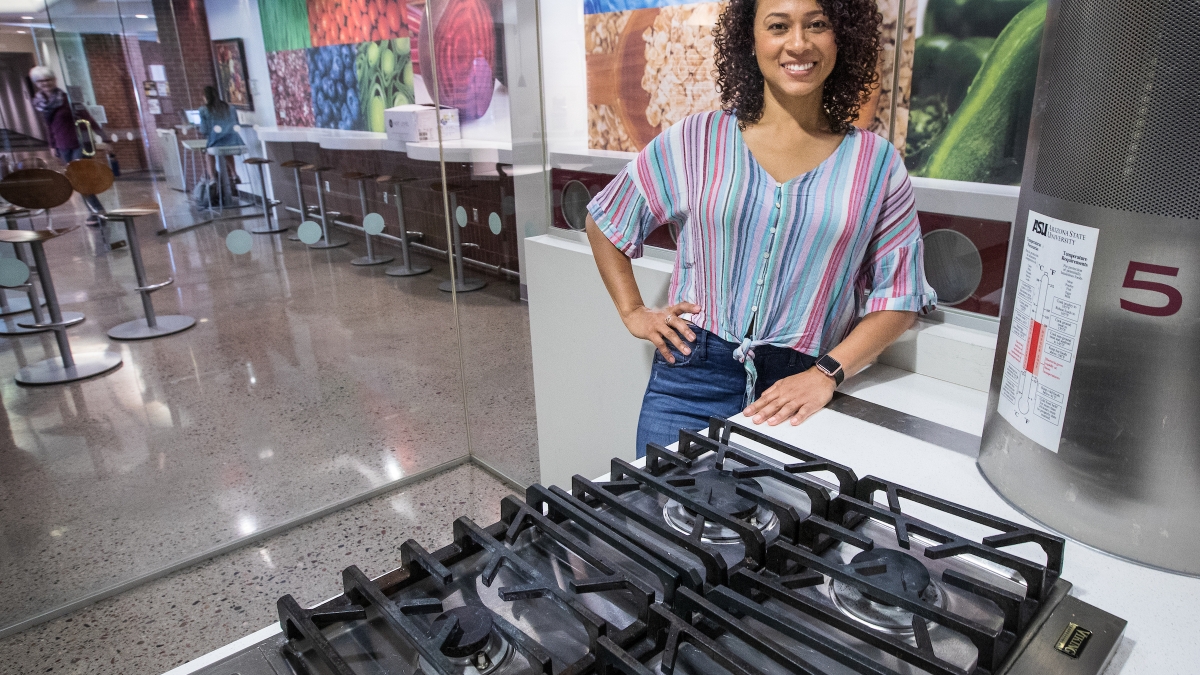Editor’s note: This is part of a series of profiles for fall 2019 commencement.
The road to success is more often winding than a straight line, and Vanessa Porter knows all about that. Porter will graduate this December with a bachelor’s in nutrition dietetics from Arizona State University’s College of Health Solutions, but her journey there began more than a decade ago.
After graduating from high school in the early 2000s, the Chicago native spared no time in her pursuit of higher education, going straight into Northern Illinois University. She made it through three years when personal circumstances caused her to drop out. Porter went to work full time at a market research company, working her way up over the years, but her passion for healthy living never went away.
In her spare time, Porter took pre-requisite courses and applied to a nutrition program at a school in Chicago but ultimately was not accepted.
“I was like, ‘Fine, I'm done,’” she said of her feelings about school at the time. “Then my dad passed away and I was like, ‘Okay, I need to do something.’”
Porter’s father had been dealing with Type 2 diabetes since she was young. His passing was the wake-up call she needed to fully commit to a career dedicated to helping people lead healthy lifestyles.
“It's weird, it was one of those things I didn't realize how serious it was until after he passed away because he had it for so long that I kind of just took it for granted,” she said. “It was a nasty, nasty ending. And it happened really fast.”
Porter’s father grew up in poverty in Chicago’s’ inner city, losing an eye in an act of racially motivated prejudice as a child. He was so determined to get out of that situation that when he turned 18, he stamped his Army papers himself when the recruiter wasn’t looking so they wouldn’t turn him away because of his missing eye.
“My dad was such a fighter, from what he came from in his life, and to just see him decline like that, it was hard,” Porter said.
Despite the motivation it gave her, there were a couple more hiccups along the way: Porter’s father died in July 2007 and she enrolled in a nutrition program the very next month, before she was ready, having not yet dealt with the emotional trauma, and ended up dropping out a second time. And after some success as a personal trainer, the gym she worked for went out of business. Porter ran her own studio for a while after that, but an incompatible business partnership resulted in the dissolution of that endeavor.
Finally, Porter met her now-husband, who was traveling back and forth between Chicago and Phoenix for work. She suggested they make a fresh start and move full time to the Valley of the Sun. That’s where she heard about ASU’s nutrition dietetics program.
“Then now, here we are,” Porter said, beaming.
Question: What was your “aha” moment, when you realized you wanted to study nutrition dietetics?
Answer: I'd always been into fitness growing up. During high school, I was always like the healthy one in the house, doing silly things like tracking calories. I didn't really know what I was doing but I had a food scale and I was telling everybody in the house how to eat and stuff like that. But the major push that got me back into the nutrition field was when my dad passed away and I felt a sense of needing to be really purposeful, because life is short.
Q: What’s something you learned while at ASU — in the classroom or otherwise — that surprised you or changed your perspective?
A: There’s so much when it comes to learning about nutrition that’s almost immediately applicable. Pretty much with every class, I learn something I can apply to my life, today.
Q: Why did you choose ASU?
A: I heard about the nutrition dietetics program from a girl I met while I was doing fitness competitions. I was like, 'Oh my god, that’s what I wanted to do,' and I started years ago but didn’t finish. She had good things to say about it and made it seem achievable, which was great, because I felt kind of defeated from my previous experiences with other programs.
Q: Which professor taught you the most important lesson while at ASU?
A: (Clinical Associate Professor) Lisa Morse. I did a study abroad trip with her and had her for two classes. The study abroad trip was a crazy, four-country-filled three and a half weeks. All Scandinavian countries: Iceland, Denmark, Norway and Sweden. Planes, trains and automobiles, literally. We were studying their nutrition but also their health system, because it's so different, it's socialist. But in general, Professor Morse always made it seem like it’s not as difficult as you would think it is to be a registered dietitian in a clinical setting. She also let it be known that it's not going to be exactly the way that we're learning it in class, and there’s no one set way to treat your patient. It's all about trial and error.
Q: What’s the best piece of advice you’d give to those still in school?
A: Just stay in the fight and don't give up, even if it looks kind of grim or you do bad on the first test or you just feel like you can't pick it up. Because this major, nutrition dietetics, involves heavy, heavy science. I took biochemistry, I took organic chemistry. It's very heavy science, because you’re learning how all of that stuff breaks down in your body. So I would say to just stick with it. You will get it if you put the energy and focus into studying. And read out loud. That's another one of my favorite tips. When you read the text out loud to yourself, it's like you're getting it twice. You're looking at it but also hearing it again. It sounds weird, but I feel like that seriously helped my studying.
Q: What was your favorite spot on campus, whether for studying, meeting friends or just thinking about life?
A: The library downstairs at the University Center (on the Downtown campus). You can’t do a lot of reading out loud but it’s good for getting assignments done when you need quiet.
Q: What are your plans after graduation?
A: To become a registered dietitian, you have to do either a straight internship, or you can do a dual internship, graduate degree program. I’ll be applying to a dual internship, graduate degree program in February, because by 2024, it's going to be mandatory for registered dietitians to have a master’s degree. I'm going to apply here (in Arizona), in Illinois and possibly California. Just to keep my options open, because it's really competitive. Then, first, I want to be a registered dietitian in a clinical setting, where you treat more critical patients who have experienced some kind of trauma, like burns or gunshot wounds, and need tube feedings. So I want to do that for a little bit, get that experience, then I want to work for myself again and combine fitness and nutrition as a personal trainer. Because that was the hardest thing; you see some progress with clients, but you only see them for two hours a week, so if they go home and they're not they’re not eating right, they’re not going to keep getting good results. So now, having the registered dietitian credentials, I can do some major things with that.
Q: If someone gave you $40 million to solve one problem on our planet, what would you tackle?
A: I would work to reduce the obesity epidemic. It’s such a multi-layered issue. I'd do some lobbying for big food companies, because that's where a lot of the problem is, because they have so much money to lobby and make sure we continue to eat their crap. I’d also work to help with food insecurity because, believe it or not, that's a big source of the obesity epidemic. You would think that, for instance, people who are on food assistance should be skinny but they’re overweight because all they can afford to buy is processed food. So it's a horrible cycle with the obesity epidemic. Forty million might not actually be enough!
Top photo: ASU College of Health Solutions student Vanessa Porter will graduate with her degree in nutrition dietetics this December. Photo by Charlie Leight/ASU Now
More Health and medicine

Dynamic data duo advances health research
The latest health research promises futuristic treatments, from cancer vaccines to bioengineered organs for transplants to medical nanobots. While these technologies may one day be…

New study reveals high levels of toxins in seized cannabis from Arizona and California
A recent study conducted by researchers from Arizona State University has uncovered alarming levels of Fusarium mycotoxins in illicit cannabis samples seized in Arizona and California.The study found…

PhD student builds bridges with construction industry to prevent heat-related illnesses
It is no secret that Arizona State University has innovative researchers working to help solve everyday problems.According to a new preliminary report issued by Maricopa County, there were more…


